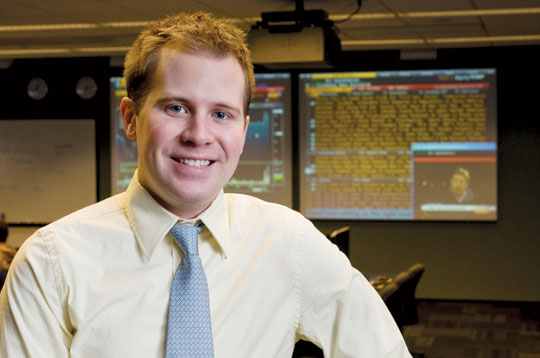Training lab offers an edge in the market

ON THE GREEN | Last summer, Erik Kuhn, a senior accounting major and economics minor, landed a coveted position as an intern at Bloomberg in New York City and hit the ground running, thanks to his knowledge of the Bloomberg Professional service through the Exelon Trading Center in the Lerner College of Business and Economics.
“Bloomberg is a unique program, and learning how it works and displays information can be a little confusing at first,” Kuhn says. “My experience in the UD lab helped me better understand the workshops that all the interns had to go through during the first week.”
The company was founded in 1981 by Michael Bloomberg, now mayor of New York. It employs more than 10,000 people in some 135 offices around the world. The Bloomberg Professional service, the company’s core product, is the fastest-growing real-time financial information network in the world.
The trading center, also known as the Exelon laboratory, is a 2,200-square-foot educational trading facility designed to replicate the trading floors in investment banks, brokerage houses and hedge funds on Wall Street. The center incorporates the same computer hardware, software, networks and market data feeds found in every major financial institution throughout the world.
The center receives real-time and historical data from Bloomberg and Reuters on stocks, bonds, commodities, futures, currencies, real estate, options and other derivative products. The systems also provide a variety of fundamental and technical analyses.
“Through the Exelon Trading Center, we have increased the quality of the academic experience within the college by allowing our students to experience real-time hands-on professional applications of the industry and empowering our faculty with high-tech teaching tools,” says Conrado (Bobby) M. Gempesaw, dean of Lerner College. “This discovery-based learning facility allows the college to stay abreast of the fast-paced world of financial markets.”
Kuhn says he saw a job opening at the Exelon Trading Center as an opportunity to expand his horizons and equip himself for success in the business world by learning about the financial reporting systems. “Delaware is one of the few schools that offer a trading lab to give students more skills, a chance that students at universities without trading labs do not have,” he says. “I familiarized myself with the software so that I could answer any question that a student might ask while completing an assignment or while browsing through the programs. Now I give workshops on the basics of the Bloomberg terminal.”
Kuhn says the trading center is being integrated into course curricula in Lerner College, and some courses now require students to attend workshops or complete projects using Bloomberg or Reuters services.
“This curriculum integration will introduce the lab to every business student and allow everyone the opportunity to take advantage of what the lab has to offer,” says Kuhn, who is planning to pursue a master’s degree in economics and finance at the Jönköping International Business School in Sweden.
Other services available at the Exelon Trading Center include Rotman Interactive Trader, an application that simulates a stock exchange and allows users to transact financial securities with each other on a real-time basis; SAS, an integrated system of software products that enables the programmer to perform statistical analysis, data warehousing, data entry, retrieval, management and mining; MATLAB, a system used for technical computing; and Wharton Research Data Services, a comprehensive economic and financial data management system intended solely for research purposes.
Article by Martin A. Mbugua, BE ’09M





